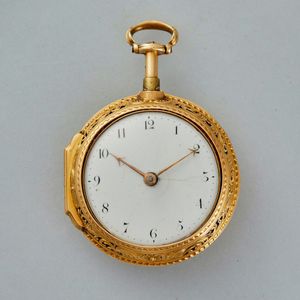Eardley Norton Gold Repousse Quarter Repeating Watch
An Eardley Norton gold repousse quarter repeating key wind open faced pair cased watch, gilt metal full plate cylinder movement with finely engraved and pierced balance cock. The movement signed 'Eardley Norton London' and numbered 2668. The white enamel dial with Arabic numerals, gold 'Arrow' hands. The pierced and engraved gold inner case hallmarked London 1769. The gilt metal repousse outer case depicting a classical scene of justice. The cloth to the inside 'To a friend' and hand written 'I. B. Marshall. A small token of Brotherhood T. M.' with a black leather travelling case. circa 1769. Diameter: 1.77 in. Provenance: Sotheby's 1982, the collection of Dr Trevor Hyde, Sydney, acquired from the above. Other Notes: Eardley Norton, born 1738, Lincolnshire, working from 49 St John Street, Clerkenwell London from the mid 18th century. He is recorded as patenting in 1771 a striking mechanism for clocks and repeating movement for watches. Member of the Clockmakers Company in 1770. Condition: gilt metal external case in excellent condition with no rubbing. Enamel dial has a very fine hairline fracture. Glass is excellent. Inner gold watch case is in fine condition with internal hallmarks. Inner movement is jewelled and signed. Overall, in very good condition with no visible signs of repair or damage.
You must be a subscriber, and be logged in to view price and dealer details.
Register Now to view actual auction price for this item.
- Pair Cased - A pair cased watch is one with a double case. The movement is encased, and for additional protection this is fitted into an outer case.
- Embossed / Repousse - Embossing, also known as repousse, is the technique of decorating metal with raised designs, by pressing or beating out the design from the reverse side of the object.It is the opposite of chasing, where the decoration is applied from the front. An embossed or repoussed object may have chasing applied to finish off the design.
- Movement - The technical name for the workings of a clock or watch, and does not include the dial or case.
- Circa - A Latin term meaning 'about', often used in the antique trade to give an approximate date for the piece, usually considered to be five years on either side of the circa year. Thus, circa 1900 means the piece was made about 1900, probably between 1895 and 1905. The expression is sometimes abbreviated to c.1900.
This item has been included into following indexes:
-
pocket watches, case type
- open face, gold / gold-plated case 1,381
- pair cased 165
- pocket watches, features - repeater / repeating 107
- pocket watches, period - Georgian 289
